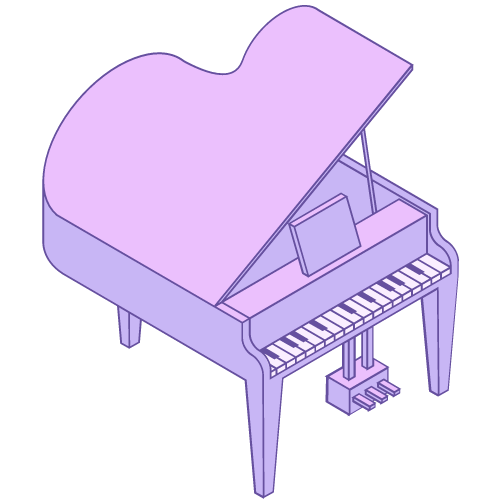Blog
When and How to Hire a Professional Piano Tuner
Whether you own a grand piano, upright piano, or a digital piano, keeping your instrument in tune is essential for maintaining its sound quality and functionality. While some piano owners attempt to tune their own pianos, hiring a professional piano tuner is often the best choice for ensuring your piano is tuned correctly and kept in optimal condition.
In this guide, we’ll explore when and how to hire a professional piano tuner to help you preserve the longevity and performance of your instrument.
When to Hire a Professional Piano Tuner
1. After Moving Your Piano
Moving a piano is a delicate process, whether it’s being relocated across the room or to a completely new location. Even with the greatest care, a piano may go out of tune after being moved, as the vibrations, temperature changes, and physical handling can affect the strings and internal components.

When and How to Hire a Professional Piano Tuner
- Why it matters: The shifting of the instrument during transport can loosen or shift the strings, which may lead to the piano sounding out of tune.
- What to do: Hire a professional tuner to restore the piano to its proper pitch after it has been moved. This is especially important if the move involved significant distance or drastic changes in environmental conditions.
2. When You Notice the Piano Sounds Off
If your piano sounds “off” or doesn’t produce the bright, clear tones you expect, it’s time to hire a tuner. While minor fluctuations in tuning may go unnoticed by casual players, they can become more pronounced over time.
- Why it matters: A piano that is even slightly out of tune can sound harsh or dissonant, affecting both the overall sound and the playability of the instrument.
- What to do: If you notice your piano is not holding its tune, or if certain notes sound noticeably sharp or flat, schedule a professional tuning to restore the instrument’s full harmonic range.
3. Once a Year (For Regular Maintenance)
Even if your piano doesn’t seem out of tune, regular tuning is important to maintain its sound quality and mechanical condition. Most pianists recommend having your piano tuned at least once a year, although some may need more frequent tunings based on usage and environmental conditions.
- Why it matters: Pianos naturally go out of tune over time as the strings stretch and settle. Regular tunings help keep the piano in peak condition and allow the technician to spot any potential problems early.
- What to do: If your piano isn’t frequently played, an annual tuning is sufficient. For pianos that are played often, or in high-traffic environments, more frequent tunings may be needed (every 6 months or even 3 months in some cases).
4. Before Major Events or Performances
If you’re planning for a special occasion such as a concert, recital, or a special event at home (like a wedding or party), it’s a good idea to have your piano professionally tuned just before the event to ensure it sounds its best.
- Why it matters: A well-tuned piano will sound clearer and more harmonious, providing a pleasant listening experience for both performers and audiences. Tuners can also check the action and hammer mechanisms to make sure everything is functioning properly before a performance.
- What to do: Schedule the tuning at least a few days before the event, as it may take time for the piano to settle after the adjustment.
5. When You Hear Strange Noises
If you notice unusual sounds such as buzzing, rattling, or uneven sounds while playing, it may be a sign that something is wrong inside the piano. While some noises may be due to the piano being slightly out of tune, others could be related to mechanical issues.
- Why it matters: Strange noises could indicate problems such as loose or damaged strings, broken parts, or an issue with the action or pedals. A professional piano tuner will not only tune your piano but also check for any underlying mechanical issues.
- What to do: Contact a professional tuner to investigate and resolve the issue, ensuring that both the sound and mechanical performance are up to standard.
6. If Your Piano Hasn’t Been Tuned in Over a Year
If your piano has gone without tuning for over a year or longer, it’s definitely time to call a professional. A piano that’s been left untuned for an extended period may have significant tuning issues that require more effort to correct.
- Why it matters: Pianos that haven’t been tuned in a long time may experience more drastic tuning issues, as the strings may have settled in an irregular way or become overly tight. This can affect pitch and may even result in damage to the strings or internal components.
- What to do: Contact a professional tuner to get the piano back into proper condition. In some cases, the tuner may need to tune the piano multiple times in a series to achieve proper pitch.
How to Hire a Professional Piano Tuner
Once you’ve decided that you need a professional piano tuner, the next step is finding the right person for the job. Here’s how to ensure you hire the best piano tuner for your needs:

1. Ask for Recommendations
One of the best ways to find a reliable piano tuner is by asking for recommendations from people you trust. If you know other piano owners, musicians, or music teachers, ask them for suggestions.
- Why it matters: A personal recommendation can help you find a reputable tuner with experience and a proven track record.
- What to do: Reach out to friends, family, and colleagues who are musicians or piano owners. They may know a trusted technician who specializes in your type of piano.
2. Check for Certifications
While there are no strict licensing requirements for piano tuners, there are certifications and professional organizations that can help you find qualified professionals.
- Why it matters: Certification from a respected organization, such as the Piano Technicians Guild (PTG), indicates that the tuner has received specialized training and adheres to professional standards.
- What to do: Look for a tuner who is certified by the Piano Technicians Guild or another respected organization. Certification ensures that the tuner has the skills and knowledge to properly care for your piano.
3. Look for Experience and Specialization
While many tuners are experienced in tuning a variety of pianos, some specialize in certain types of instruments (e.g., grand pianos vs. upright pianos, or digital pianos vs. acoustic pianos).
- Why it matters: Specialized knowledge can help the tuner address specific needs for your piano type, ensuring optimal results.
- What to do: When contacting a tuner, inquire about their experience and whether they specialize in the type of piano you own. Be sure to mention whether you have a grand piano, upright, or a digital model.
4. Inquire About Rates and Availability
Piano tuning rates can vary depending on location, the type of piano, and the tuner’s experience. Before hiring a tuner, ask about their rates and availability.
- Why it matters: Knowing the cost upfront will help you avoid any surprises. Some tuners may offer discounts for regular customers or package deals for multiple tunings.
- What to do: Ask for an estimate of the tuning cost and inquire about any additional charges for repairs or adjustments. Additionally, check their availability to ensure they can tune your piano when you need it.
5. Schedule a Consultation
If you’re unsure about which tuner to hire, consider scheduling a consultation. This will allow you to assess their skills and see if they’re a good fit for your needs.
- Why it matters: A professional tuner should be able to offer advice on maintenance and provide insight into how best to care for your piano.
- What to do: During the consultation, ask questions about their experience, the types of pianos they specialize in, and any additional services they offer (such as repairs or action regulation).
Conclusion
Hiring a professional piano tuner is an essential part of piano ownership. Whether it’s for regular maintenance, post-move tuning, or pre-performance preparation, having a qualified technician ensure that your piano stays in top shape will enhance your musical experience and prolong the life of your instrument.
Remember that tuning your piano isn’t just about keeping it in tune – it’s also about maintaining the piano’s sound quality, mechanical performance, and overall condition. If you notice any issues or if it’s been a while since your last tuning, don’t hesitate to hire a professional tuner to get your piano back into optimal form.
By following the tips in this guide, you can find the right piano tuner and ensure that your instrument continues to produce beautiful, harmonious music for years to come.


